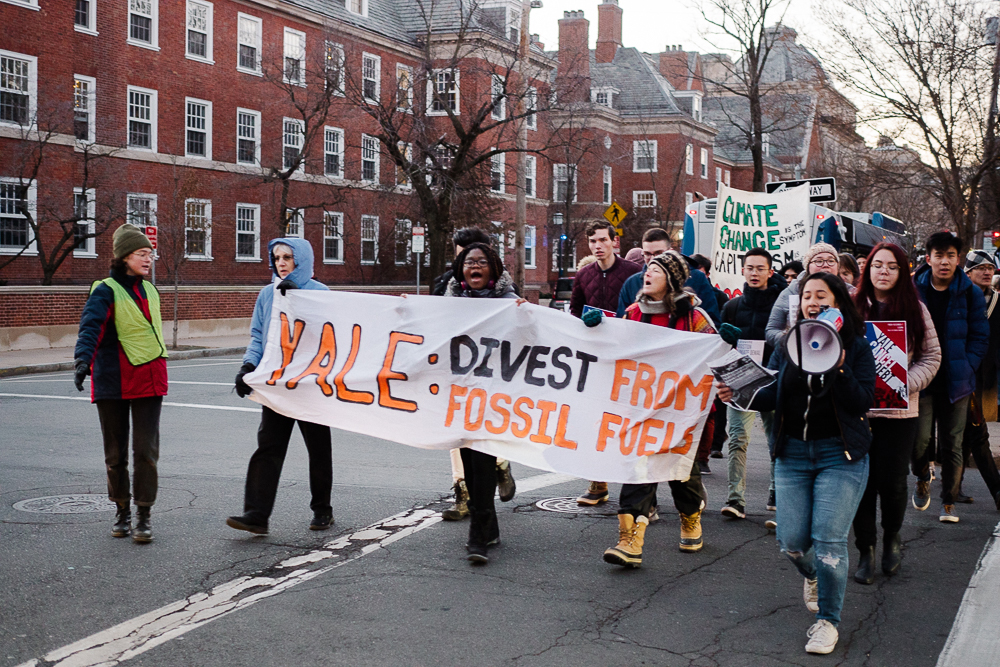
Reuben Ng
Nearly 50 student protesters received notice from the Yale College Executive Committee — the body that adjudicates disciplinary infractions — stating that the committee has opened formal investigations into their conduct for “Trespassing” during sit-ins at the Investments Office, according to five students with knowledge of the situation.
The Executive Committee notified the students, who are associated with the Endowment Justice Coalition, on April 3 because of the students’ involvement in two different protest activities at the Investments Office — one in December and the other in March. During both demonstrations, students sat outside Chief Investment Officer David Swensen’s office and chanted in the lobby of 55 Whitney Ave. The police frequently asked the students to leave on both days, and when the building closed at 5 p.m., the students remaining inside received community service summons or $92 fines, which the students crowdfunded. Before leaving, a Yale police officer also made note of each student’s identification information.
But after months of radio silence from the Yale administration, the roughly 50 students reportedly received notices from the Executive Committee, stating that they “may have violated the Undergraduate Regulations regarding ‘Trespassing,’” according to a copy of one student’s notice obtained by the News. The notice also informed students they should select an adviser to provide guidance and informed each individual student they could respond to the allegation in writing.
“I do respect the work that the Executive Committee does, but that doesn’t change the fact that we are being essentially punished for peacefully protesting,” said Adriana Colón-Adorno ’20, one of the student protesters who received a letter from the committee. “Even if we’re not given any disciplinary punishment, that doesn’t change the time and effort and energy that this whole process is taking from us.”
One of the notified students — who asked to remain anonymous for fear of retribution — saw the timing of the notification, which fell close to Bulldog Days, as an intimidation tactic designed to discourage any further protest action while prospective students were on campus.
She added that the police report listed the victim of the crime as “society.”
“We’re doing this because we’re trying to solve the climate crisis,” the anonymous student said. “It’s a very strange thing to be referred to as a menace to society.”
In interviews with the News, four protesters who received the Executive Committee notice said that the threat of disciplinary action will not discourage the Endowment Justice Coalition from further activism.
Jamie Chan ’22 said the notification and her previous police citations have made her wary of participating in future sit-ins for fear that it could affect her standing at Yale. Still, she added that she hopes to continue advocating for divestment from the fossil fuel industry and Puerto Rican debt through other channels, such as banner marches or other lower-risk forms of direct action.
“Even though I’m a bit intimidated by whatever actions that the Executive Committee can have on me, I’m definitely not backing down in that sense,” Chan said. “Having a habitable, just future is definitely more important to me than just being a Yale student. I still think that student activism is very important in keeping the Yale administration accountable. The fact that they’re placing these disciplinary measures on us is a sign that we are a disruption — it’s a signal that we can’t be ignored.”
Paul North, chair of the Executive Committee and professor of Germanic languages and literatures, said that the Executive Committee, as an independent body, is “very consistent for holding hearings for anyone who broke the rules.”
He added that he hopes the students work out their demands with the University through other methods, such as town halls or meetings with administrators.
“I would hope that the students in the protests would sit down with officials at Yale and talk out their differences as soon as possible because this doesn’t seem to be the most salutary way to go,” North said. “We would prefer not to see protest groups at ExComm.”
Several of the students who received the letters told the News that they are optimistic that they will not face harsh disciplinary measures for their actions.
Colón-Adorno, one of the students who received the notice, said students who received the letters have spoken with peers who have gone through the Executive Committee process in the past. She said that by examining previous cases, they found that the Executive Committee tended to be lenient toward students who participated in nonviolent direct action.
“There’s no guarantee of what will happen with these, but we hope that the Executive Committee will continue to be sympathetic toward activists by recognizing the service we’re doing for the Yale community,” she said.
Colón-Adorno added that the Executive Committee process and risk of punishment are still “scary” for many students and “worrying to families who have sacrificed a lot to have their kids here.”
Max Teirstein ’21 believes that the student activists have “backed Yale into a corner” with how it can handle potential disciplinary measures.
Teirstein added that Yale would not be able to suspend or expel the students involved in the sit-in because “the school would freak out.” and the national media would likely cover the incident. Still, the school cannot sit idly by and risk making conservative donors angry, Teirstein argued.
“So what can they do?” Teirstein said. “They’re trying to scare us, but in reality, they are the ones that are scared.”
In the 2016–17 academic school year, 45 students were charged with academic dishonesty.
Asha Prihar | asha.prihar@yale.edu
Carly Wanna | carly.wanna@yale.edu







